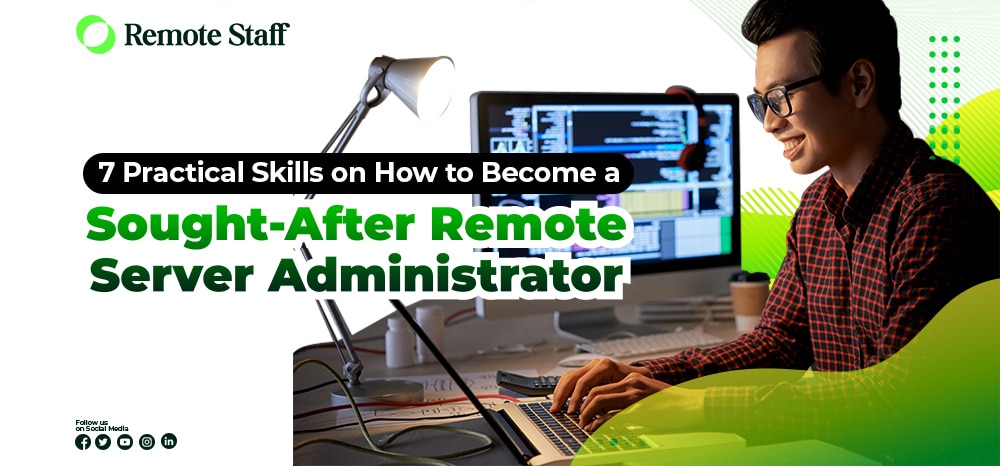One type of job that has seen an increase in importance is the online server administrator job. With remote work, the need to maintain, optimize, and design new servers has become very important. Without them, where will workers store and compile all their outputs while working from home?
Also, companies need redundancies in their data storage outside the main office. A major glitch can cause data loss translating to thousands of dollars lost.
Remote work, thus, has led to an increased demand for online jobs for skilled remote system administrators and other system admin jobs.
Remote System Administrator’s ensure the network’s security, troubleshooting, and backup of data. They can also train employees to access and safeguard network assets properly.
In this article, here are some tips on how to be a sought-after remote system administrator. As someone who’s also working remotely, I could honestly say that my work greatly depends on the competence and skill of Remote Staff’s server administrators.
Here are 7 practical skills on how to become a sought-after remote server administrator.
Technical Skills
Managing databases is not something you can learn overnight. You need to have the technical skills to know how the program works and to fix and improve it over time. Here are some programming languages that you should be adept with.
- SQL
- Python
- PHP
- R
- C#
Take note; you might need to learn new programming languages, depending on the needs of your client.
Analytical Skills
As a sought-after remote server administrator, you will have data gathered every day. You will find groups of data that may seem irrelevant today. But patterns do arise that may lead to future problems when left unattended.
Do you have the analytical skills to separate the clutter from the essential information?
Process the data with your analytical skills and find upgrades, troubleshooting, or solutions before it becomes a big deal.
Problem-solving Skills
With the data gathered, what do you do if something might go haywire? After all, a few minutes of downtime might mean thousands of dollars lost for the company.
Your problem-solving skills will be handy in this career. Given the situation, do you need to troubleshoot, upgrade, or replace the problem?
Hone your problem-solving skills to discern the proper action for the problems at hand.
Security and Monitoring
More often than not, your database and servers will work most of the time. But the crucial part is maintaining it to never shut down unexpectedly. But what do you do when you are not monitoring it yourself? After all, you can’t monitor your client’s database 24/7. What if there’s a DDoS attack or vulnerability exploited?
You should have security and monitoring mechanisms in place. Depending on the program, you should know how to input safeguards that can protect your client’s servers and data. And the worst case, create backups to make it work while fixing the root cause of the problem.
Cloud Computing
You will work with cloud computing software as a remote server administrator. Your database is probably far from the main ones. With that, you should know how to handle your company’s assets through the cloud. Maintaining, troubleshooting, and upgrading it with your client’s needs is, of course, crucial as well.

Communication Skills
This advice should be another no-brainer, but a lot of people still seem to forget this. Part of a remote system administrator’s job requires them to communicate with their clients regularly to report the conditions of their client’s servers. From simple routine maintenance to server crashes, you must report these to your clients so that they have an idea of their servers’ conditions. You might need to relay this information also to your teammates using it.
When talking to your clients, always strive to communicate via simple terms instead of jargon so that they can understand your report. Also, don’t be afraid to speak of any problems you may have encountered, as this allows both you and your client to find ways to resolve them.

Remain Flexible and Adaptable While Working
It won’t be every day that you’ll be assigned to manage your company’s servers during the day. Sometimes, you will get a night shift or even a graveyard shift as your assignment. It can even be on-call in times of emergencies.
Situations such as these are challenges that will test your ability to adapt to a myriad of different situations you will encounter at work. Being flexible and adaptable allows you to accomplish your tasks without too much difficulty.
And it also translates to new innovations in your field. Are you up-to-date with the latest technology? Do you have disaster preparedness contingency plans for just-in-case scenarios?
You need to have flexibility and adaptability to continue to be relevant in the months ahead.

Conclusion
These are a few of the many ways you can become sought-after for a remote server administrator job. But honing these skills will surely get you ahead of your competition.
If you’re looking for opportunities in this field, you can check out these remote careers in the Philippines. Cheers!






